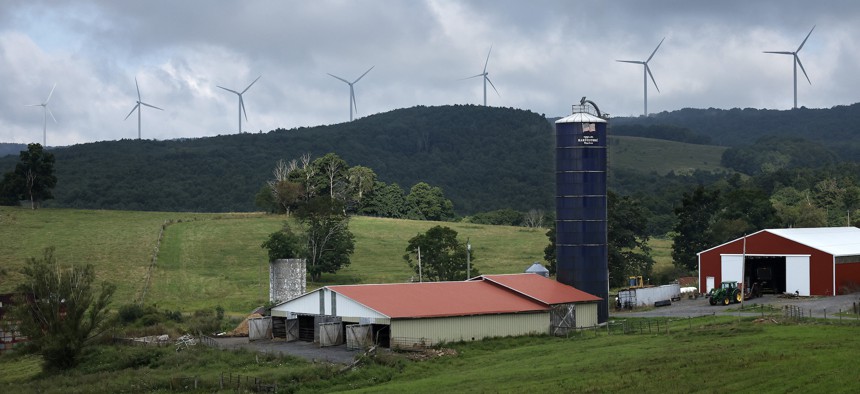Connecting state and local government leaders
The Biden administration wants to give the fossil fuel "energy communities" of coal country and beyond an economic boost.
This story was first published by Grist. Read the original article here.
Community advocates in the coalfields of central Appalachia and other places dependent upon fossil fuel production have long insisted that their towns cannot be left behind by the nation’s switch to renewable energy. The Biden administration has responded to such calls by working to ensure under-resourced communities benefit from this green transition.
To help achieve that, the Inflation Reduction Act includes a 30 percent tax break for wind, solar and other green energy projects. It provides an additional 10 percent credit for projects in “energy communities”—those long anchored, and polluted, by fossil fuel industries. The tax break is intended for energy developers and manufacturers that might relocate to a community, employ local people and contribute taxes to the local government.
Last week, the Treasury Department outlined how clean energy companies can secure those credits. For a project to qualify, at least 0.17 percent of the targeted community’s employment or 25 percent of its tax revenue must be related to the extraction, processing, transport, or storage of coal, oil, or natural gas.
Although the program will help cities and towns nationwide, the need is particularly acute in Appalachia, where coal industry jobs fell 54 percent between 2005 and 2020, according to a report by the Appalachian Regional Commission. Along with its guidelines, the Treasury Department released a map indicating in red which U.S. counties might be eligible for these projects. The coalfields of central Appalachia, particularly West Virginia and portions of Virginia and Kentucky, are almost solidly red.
“Communities like coal communities have the knowledge, infrastructure, resources, and know-how to play a leading role in the move to a clean energy economy,” Wally Adeyemo, deputy U.S. treasury secretary, said, according to Reuters.
Many of the people in those areas are growing amenable to the wind turbines and photovoltaic arrays that are increasingly common sights. Tony Smith founded Secure Solar Futures in Staunton, Virginia, in 2004, and says the technology didn’t always enjoy broad support in the region. “We were trying to develop a solar project in southwestern Virginia and were met by resistance from the coal industry, and it died,” he said.
That attitude has slowly begun to change, and the company and its partners, including Mountain Empire Community College, have made a point of using the region’s expansion of solar energy as a chance to invest in the the workforce. Together they’ve developed an apprenticeship program that employs students for several weeks and pays them $17 per hour while providing them with gear, training, and networking opportunities.
The opportunities extend well beyond installing photovoltaic panels, Smith said. There’s work to be done in everything from maintenance to accounting to engineering, and the skills required to work in the solar power industry—or wind, for that matter—are applicable in carpentry, electrical work, and other trades. “A lot of jobs come about during installation, but the solar business itself is multidisciplinary,” said Smith.
A 2020 study by West Virginia University found renewable energy is increasingly competitive in Appalachia. Beyond Secure Solar Futures and the Solar Workgroup, a whole crop of renewable energy projects are popping up in the coalfields there. Black Rock Wind Farm in Mineral County, West Virginia, for example, has created 200 union construction jobs since last year. Many of these companies, including Solar Holler in Huntington, West Virginia, work alongside union apprenticeship programs.
Some projects are finding new uses for the thousands of acres of unreclaimed minelands that dot the region. In 2021, a former Democratic state auditor in Kentucky announced a massive utility-scale solar farm atop a strip mine in Martin County. The Nature Conservancy is exploring the possibility of renewables development on some 13,000 acres of strip-mined land on the 253,000 acres it owns in Kentucky, Virginia, and east Tennessee.
The tax credit outlined in the IRA also may help energy developers bypass one major obstacle to getting green projects started: sluggish state legislatures that are friendly to fossil fuels and uncertain about energy transition. Recent reporting by Inside Climate News showed that Kentucky, despite a 65 percent decline in coal production since 2013, ranks last in the country for wind and solar energy production. The state recently passed legislation intended to forestall the closing of 50-year-old coal-fired power plants.
Still, Smith is encouraged by the changing attitudes he’s seen in some state and local lawmakers. In West Virginia, for instance, legislators recently doubled the cap on power purchase agreements, which will allow savings for homeowners, schools, and nonprofits with smaller solar arrays.
“The IRA will help accelerate investment in these communities, which would otherwise be difficult because they are more remote,” he said. Renewable energy developers in the region still face major challenges in under-resourced mountain communities, most of them related to supply chain issues, outdated electrical systems, and facilities in poor repair. A tax credit could provide the boost needed to see more clean energy projects past the finish line.

NEXT STORY: Schools Find Power in Numbers



